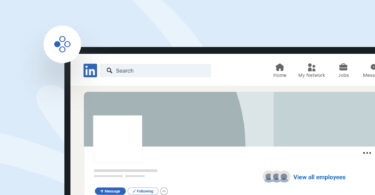Entrepreneurs and thought leaders wear many hats – content creators, industry authorities, and social media gurus. However, managing a thriving online presence across multiple locations remains challenging, even for the most seasoned leaders.
Here’s why: A recent Birdeye survey of over 200,000 customers uncovered complexities in social media management for multi-location businesses. According to the survey:
- 81% centralize social media management.
- 44% rely on a combination of in-house teams and agencies at different locations.
This juggling act can lead to inconsistencies and inefficiencies in businesses’ online presence.
That’s where social media management software comes in – the only aid for thought leaders and multi-location businesses to streamline their efforts.
In this article, we explore the top five social media management tools loved by industry experts and look at their features, unique strengths, and suitability for various business needs.
- What are social media management tools?
- Challenges social media managers face
- Benefits a social media manager needs in a social media management tool
- Top 7 social media management tools in 2024
- Features thought leaders seek in social media management tools for their businesses
- What are some resources to learn more about social media management tools?
- FAQs on social media management tools
- Use Birdeye’s Social media management tool to power up your thought leadership
What are the five best social media management tools in 2024? The 9 best social media management tools in 2024 are: 1. Birdeye Social 2. Hootsuite 3. Later 4. Buffer 5. Statusbrew 6. Sprout Social 7. Keyhole 8. Planable 9. SocialPilot In this blog, we’ll discuss in detail each of their features and what makes them so customer-favorite.
What are social media management tools?
Social media management tools are software platforms designed to streamline your workflow and improve your results across all your social media channels. Social media management tools are like having a personal assistant for your social media presence. They save you time, provide valuable data, and empower you to create and execute a winning social media strategy.

Imagine having a central hub where you can:
- Schedule and publish posts: No more scrambling to post at the perfect time! Schedule and publish your content in advance for all your platforms.
- Craft engaging content: Some tools offer features to help you create eye-catching visuals, curate exciting content, and manage your social media assets like images and videos.
- Track what’s being said: Monitor brand mentions, follow online conversations about your brand, and gain valuable insights into your audience. Social listening features help you stay on top of industry trends and identify potential issues.
- Engage with your audience: Manage comments and messages from your followers in one place, fostering better communication and building stronger relationships.
- Measure your success: Generate reports on social media engagement and audience demographics. This valuable data helps you understand what’s working and allows you to refine your social media strategy for better results.
But before diving into the functionalities of these tools, let’s explore the real challenges social media managers face daily. These challenges highlight the complexities of managing social media effectively and how the right tools can help you overcome them.
Challenges social media managers face
Social media reputation management for businesses today is like navigating a complex maze. While it’s essential for connecting directly with customers and potential brand champions, managing multiple platforms with unique audience and content demands presents significant challenges.
Here’s a breakdown of some challenges social media managers face:
1. Content overload and time management
- Creating fresh, engaging content: The pressure to consistently churn out engaging content across various platforms can be overwhelming.
- Staying relevant to the trends: Social media trends move fast. Keeping up with the latest trends and adapting your content strategy requires constant vigilance.
- Scheduling and publishing across platforms: Manually scheduling posts on multiple platforms is incredibly time-consuming. Juggling different interfaces and post formats can lead to inconsistencies and missed opportunities.
2. Engagement struggles and audience insights
- Standing out from the crowd: With billions of users and fierce competition, grabbing and holding audience attention is becoming increasingly difficult.
- Understanding your audience: Knowing your target audience’s demographics, preferences, and online behavior is crucial for effective business communication. However, gathering and analyzing this data from multiple platforms can be difficult.
- Building meaningful connections: Going beyond likes and shares to foster genuine conversations and build relationships with your audience takes time and effort.
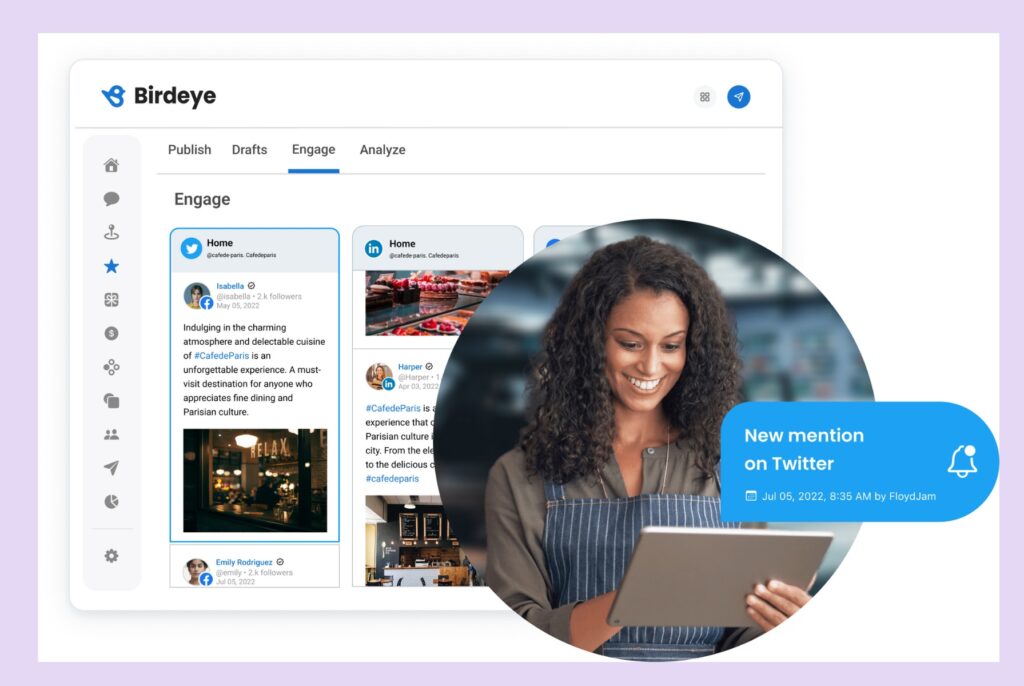
3. Platform-specific nuances and reporting
- Managing varying content formats: Different platforms excel with different content formats. Adapting your content strategy to fit the specific needs of each platform can be challenging.
- Compiling and analyzing data: Extracting meaningful insights from various platform-specific social media analytics dashboards can be cumbersome. The difficulty arises in consolidating data and drawing conclusions for a holistic view of its performance.
- Mastering different platform algorithms: Each platform has its unique algorithm that prioritizes certain types of content. Understanding these nuances is crucial for maximizing reach and engagement.

4. Collaboration and team management
- Centralized communication and task management: Ensuring seamless communication and collaboration within a social media team, especially across remote locations, requires efficient tools and workflows.
- Maintaining brand consistency: Ensuring consistent brand voice and messaging across platforms can be difficult, with multiple team members contributing to content creation and posting.
Suggested read: 28 must-have content creation tools your business needs in 2024.
5. Measurement and ROI demonstration
- Quantifying the impact of social media efforts: Demonstrating the ROI of social media strategies to stakeholders often requires clear metrics beyond simple measures such as follower count.
- Aligning social media goals with overall marketing strategy: Connecting even minor social media efforts, like choosing the right hashtags for your business, to broader business goals is crucial for justifying resources and measuring success.
These challenges highlight the complexities of managing social media effectively. However, by understanding these roadblocks and implementing the right social media management tools and strategies, businesses can overcome these hurdles and achieve social media success.
Benefits of using social media management tools ✅Saves time and increases efficiency ✅Consistent brand voice and messaging ✅Improved social media presence and engagement ✅Valuable analytics and insights ✅Streamlined collaboration and workflow
Benefits a social media manager needs in a social media management tool
Social media managers seek a toolbox that fits their needs and workflow. Here are some key factors they consider when choosing a social media management tool:
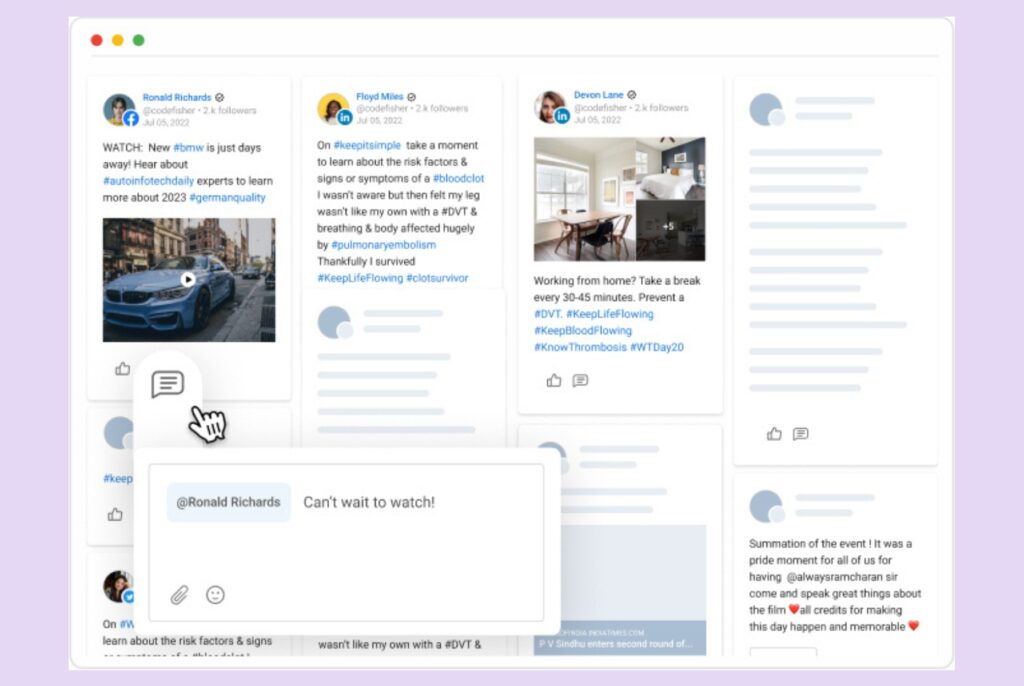
Features
- Scheduling and publishing: This must-have feature allows them to schedule posts in advance for all their social media platforms from a single dashboard.
- Content creation and collaboration: Some tools offer built-in content creation tools or integrate with other design platforms. Collaboration features are also important for teams to work together on content.
- Social listening and analytics: Powerful analytics help measure the performance of campaigns and track audience engagement. Social media monitoring tools allow them to monitor brand mentions and industry trends.
Pro-tip: Check out 10 proven social media post templates your customers can't scroll past!
Usability and efficiency
- User interface: A user-friendly and intuitive interface is crucial for saving time and managing multiple accounts efficiently.
- Team collaboration: Features like shared calendars, task assignments, and approval workflows are essential for working together.
- Free trials and demos: Many social media managers want to test out different tools before deciding.
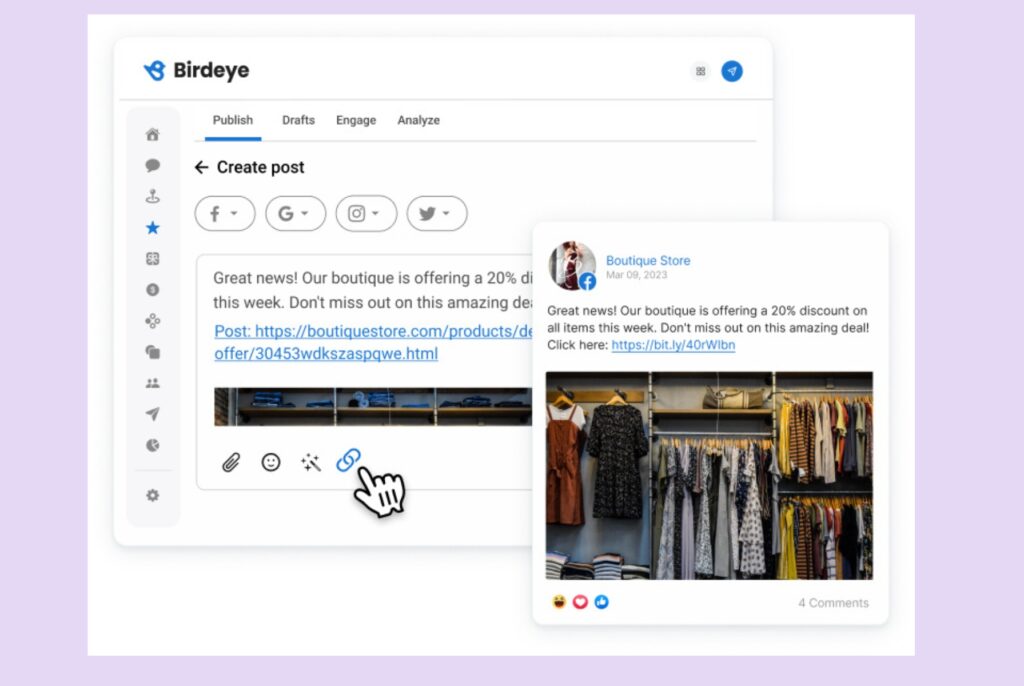
Other factors
- Supported platforms: The tool should integrate with the social media platforms the manager is using.
- Pricing: Many options are available, and different pricing tiers depend on features and the number of social media accounts managed.
- Scalability: The tool should be able to grow with their needs, especially if they manage social media for multiple clients or expect their social media presence to expand.
By considering these factors, social media managers can choose a tool that helps them streamline their workflow, publish great content, and measure their success on social media.
Stop Wasting Time! Know Which Social Media Management Tool Is Right for You Today
Want to see the impact of Birdeye on your business? Watch the Free Demo Now.
Top 7 social media management tools in 2024
As highlighted at the blog’s beginning, here are the top 5 customer-favorite social media management tools in 2024:
1. Birdeye Social
2. Hootsuite
3. Later
4. Buffer
5. Statusbrew
6. Sprout Social
7. Keyhole
8. Planable
9. SocialPilot
Let’s discuss each of these in detail.
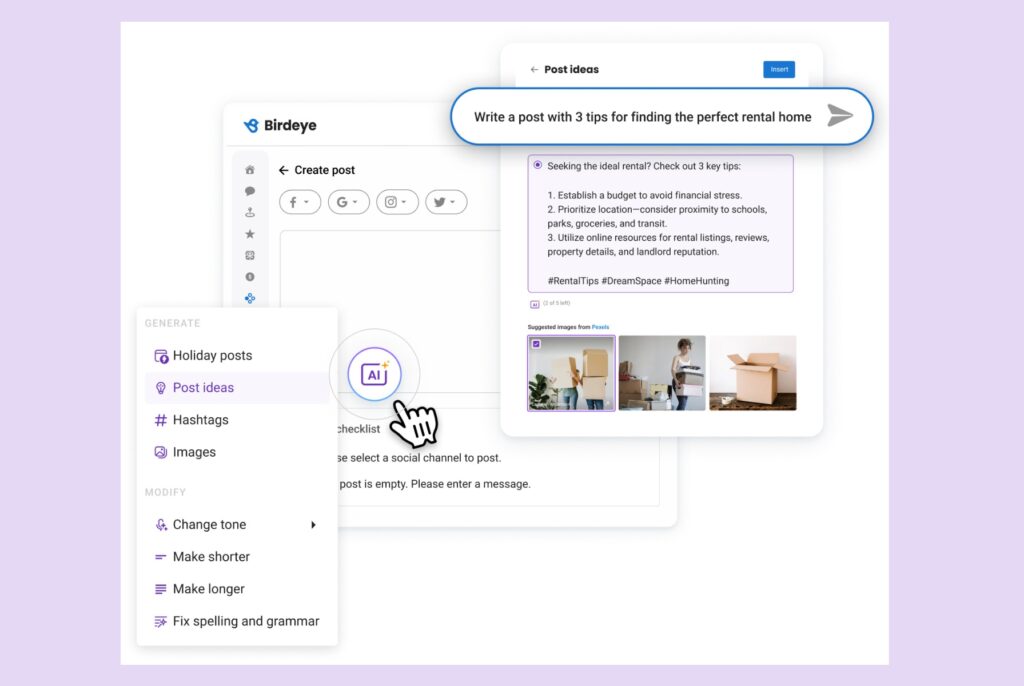
1. Birdeye Social
Birdeye Social goes beyond simple scheduling and posting. It’s an all-in-one platform designed to unify social media management with customer experience (CX) management. Birdeye caters to businesses of all sizes, but its features are particularly valuable for those focusing on a more granular local social media marketing and reputation management.
Features that make Birdeye Social so unique:
- Use AI to generate targeted social content
- Find the perfect image for your post
- Respond in seconds with AI
- Shrink your links
- Automatically share your best reviews on social
- Upload social posts from a spreadsheet
- Accelerate publishing with post and asset libraries
- Streamline approvals with automated workflows
- Schedule multiple posts and track them all through an intuitive visual calendar
- Create custom engagement feeds
Our customers, their stories: It's so important for each of our practices to share their personalities to keep that authentic local presence. Birdeye Social allows us to post across locations while still connecting with our communities. – Meghan S. Bingham, Senior Operations Manager, Valley Veterinary Care
What makes Birdeye Social the best social media management tool?
Birdeye goes beyond just being a social media management tool. It’s a comprehensive AI-driven social media platform designed to streamline your presence and amplify customer satisfaction.
Here’s why Birdeye should be your go-to social media management solution:
1. Unified social inbox for seamless communication:
- Manage all your social media profile interactions (comments, messages, reviews) from a single platform.
- Respond to customers promptly and efficiently, no matter the platform.
- Improve customer service responsiveness and build stronger relationships.
2. AI-powered content creation and scheduling:
- Craft engaging social media posts with BirdAI’s suggestions and content calendar.
- Save time by scheduling posts in advance across all your social media platforms.
- Leverage Birdeye’s social listening features to identify trending topics and tailor your content accordingly.
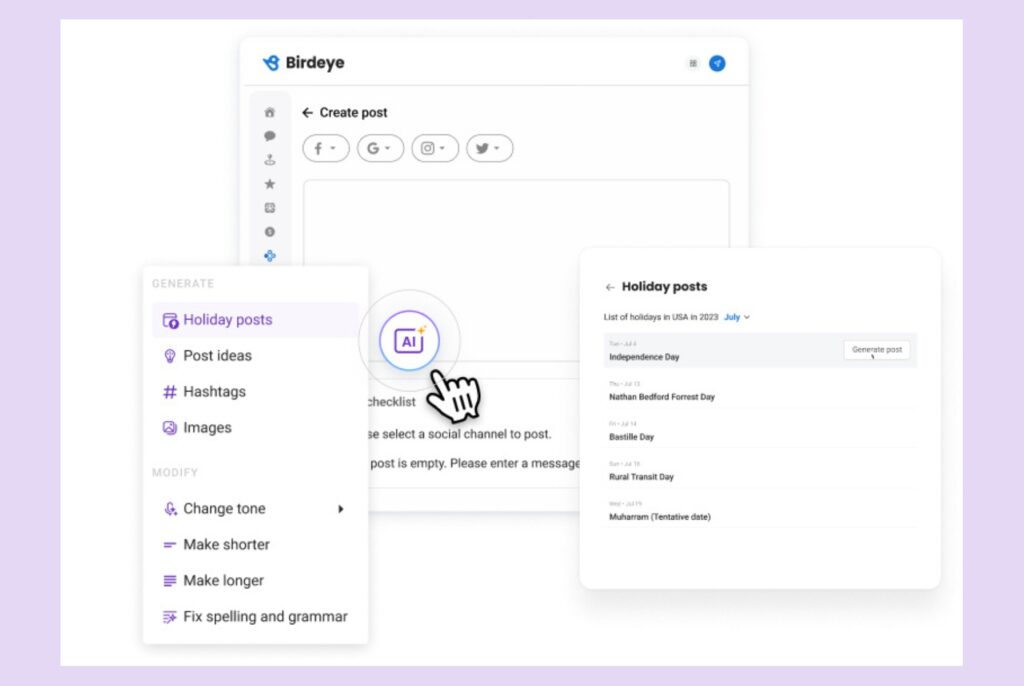
3. Powerful social listening and reputation management:
- Track brand mentions, analyze sentiment, and identify social media reviews.
- Address negative reviews promptly and showcase positive feedback to build trust.
- Gain valuable insights into customer sentiment to improve your brand image.
4. Invaluable analytics for data-driven decisions:
- Measure the performance of your social media campaigns with Birdeye’s comprehensive analytics.
- Track key metrics like social media reach, engagement, and website traffic to understand what resonates with your audience.
- Use data-driven insights to optimize your social media strategy and maximize your ROI.
5. Integrated customer experience management:
- Integrates with your online review management system, SMS marketing, and surveys.
- Enhance customer satisfaction score and loyalty across all touchpoints.
- Gain a holistic view of your customer experience and identify areas for improvement.
By leveraging these benefits, Birdeye empowers you with more than just being a social media scheduling tool; it's a strategic partner for your social media success.
Take a look at a recent success story of one of our customers and how Birdeye Social has benefited them:
How Birdeye Social media management tool benefited PRD Panania
Birdeye’s social media management tool enabled PRD Panania, a real estate agency, to centralize its social media efforts across multiple platforms. With Birdeye, they could:
- Efficiently schedule posts in advance, ensuring a consistent and professional online presence.
- Access powerful analytics and reporting features to gain valuable insights into their social media performance.
- Facilitate seamless collaboration among the team members to maintain a unified brand voice and messaging.
All these allowed PRD Panania to understand what resonated with their audience and refine their strategies accordingly.
Read what Christina Lamotta, Marketing Manager, PRD Panania complimented:

2. Hootsuite
Hootsuite is a powerhouse social media management platform built for agencies and large enterprises. It offers robust features for managing multiple brands, team collaboration, and advanced social media analytics.
Features that makes it one of the best social media management tools:
- Advanced scheduling and post approval workflows
- Team collaboration features and user permission controls
- In-depth social listening and competitor analysis
- Enterprise-grade security and compliance features
- Integrations with numerous business intelligence and marketing tools
3. Later
Later is a visual content-focused social media management platform designed specifically for creators, influencers, and marketers who prioritize aesthetics.
Features that make it one of the best social media management tools:
- Drag-and-drop visual content calendar for planning and scheduling
- Bulk posting, approval, and editing tools
- First-rate Instagram analytics and insights
- Link in bio optimization for driving traffic from Instagram profiles
- Integrations with design and photo editing tools
4. Buffer
Buffer is a user-friendly and affordable social media management platform ideal for small businesses, solopreneurs, and individuals looking to simplify their social media presence.
Features that make it one of the best social media management tools:
- Simple scheduling and publishing across major social media platforms
- Queueing and auto-posting for consistent content delivery
- Engagement tools for managing comments and messages
- Basic social listening and analytics
- Integrations with popular content creation and marketing tools
In-house or agency? Know THE solution for 360° social media management in the UK
5. Statusbrew
Statusbrew provides robust social media management solutions for brands. You can automate content workflows and moderate comments based on sentiment and emotion. In addition to automation, you’ll receive detailed performance reports across various social media and review platforms.
Features that make it one of the best social media management tools:
- Shareable calendar with publishing guardrails and automation
- Macros support for efficient customer support
- Internal labels for categorizing posts, engagements, and contacts
- Seamless integration with Salesforce, HubSpot, and Zendesk
- 230+ KPIs and metrics for comprehensive analytics
6. Sprout Social
Sprout Social focuses on customer service and community management through social media. It offers robust engagement tools and social CRM features, making it ideal for businesses prioritizing building relationships with their audience through social media.
Features that make it one of the best social media management tools:
- Powerful social listening and engagement tools for managing customer interactions
- Comprehensive social CRM features for tracking customer relationships
- Advanced customer feedback analytics and reporting with customizable dashboards
- Integrations with helpdesk and customer support platforms
- Team collaboration features and user permission controls
7. Keyhole
Loved by 100,000+ marketers and brands like Google, LinkedIn, Spotify, and Ogilvy, Keyhole is your all-in-one social media tool.
Features that make it one of the best social media management tools:
- Track any hashtag and keyword related to a brand/trend/campaign
- Schedule posts at your best time
- Benchmark your profile metrics with those of your competitors
- Perform social listening across top social media channels, news, forums, and blogs
- Compare emerging and popular trends in your location
- Generate white-label reports with shareable dashboards for easy access to real-time metrics
8. Planable
Planable is a collaborative tool designed to streamline content creation and approval for marketers and agencies. Its intuitive platform offers a visual calendar, real-time feedback, multi-platform posting, and custom workflows, making it easy to plan, review, and publish content consistently. While perfect for improving teamwork and workflow efficiency, it may lack advanced features like social listening or detailed analytics.
Features:
- Visual calendar for effortless content planning and scheduling
- Real-time feedback and approval tools for seamless collaboration
- Multi-platform compatibility to manage all accounts from one hub
- Custom workflows tailored to each client or brand’s specific needs
- Analytics add-ons for data-driven reporting and strategy refinement
9. SocialPilot
SocialPilot is an all-in-one social media management tool designed for agencies, SMBs, and enterprises looking to streamline their social media operations with ease.
Features that make it one of the best social media management tools:
- Centralized social media publishing and scheduling across multiple platforms
- Advanced analytics and reporting for data-driven decision-making
- Easy team collaboration and role-based access control
- Comprehensive review management tools for reputation building
- White-label solutions for branding and client management
- Seamless integrations with leading business tools and CRMs

Features thought leaders seek in social media management tools for their businesses
When it comes to social media management tools, thought leaders have specific needs beyond basic scheduling and analytics. They require features that empower them to amplify their voice, establish authority, and measure the impact of their efforts.
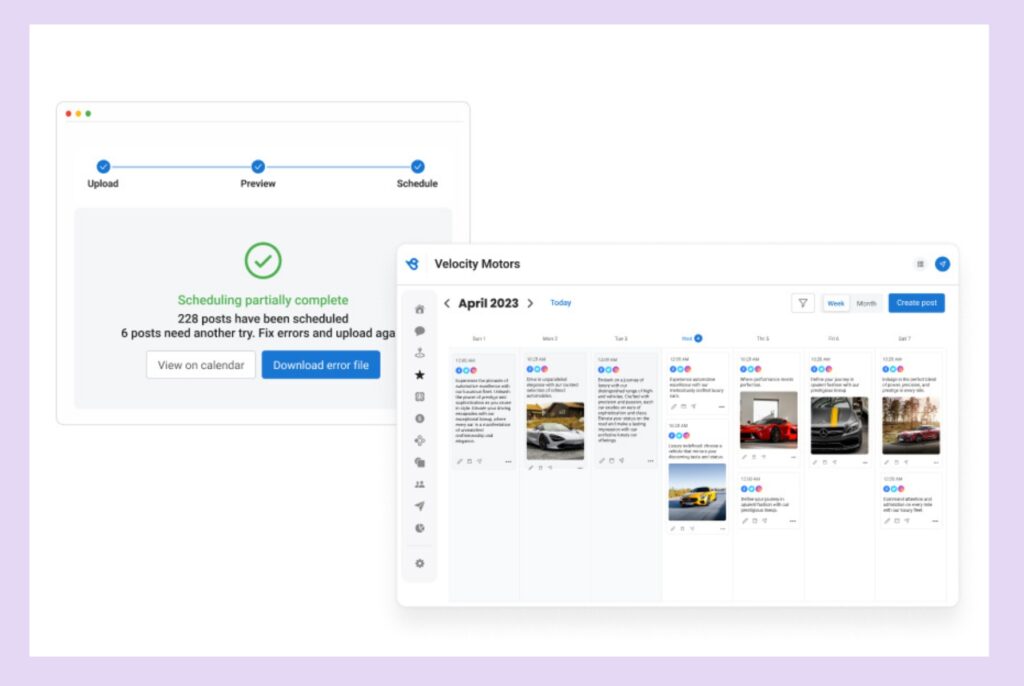
Here are some key features thought leaders actively search for and why you should too:
- Influencer identification and outreach
- Stay ahead of the curve with social listening
- Data-driven content optimization
- Integrations with marketing automation
- Advanced ROI measurement
- Benchmarking for differentiation
- Repurposing evergreen content for better ROI
- Navigate regulations with confidence
- Save time with recurring post scheduling
- Showcase expertise with white-label reporting
Let’s discuss each of these in detail:
1. Influencer identification and outreach
Imagine seamlessly connecting with relevant social media content creators in your space. Tools that help you identify these potential influential collaborators are invaluable. Streamlined outreach features enable you to build strategic partnerships, expand your reach, and collaborate to create exciting new content, amplifying your voice in the process.
2. Stay ahead of the curve with social listening
Your audience is your lifeblood. Powerful social listening features are essential for tracking brand mentions, identifying emerging topics, and gauging audience sentiment. This intel allows for proactive participation in relevant conversations, addressing potential issues before they escalate, and solidifying your position as a thought leader at the forefront of industry discussions.
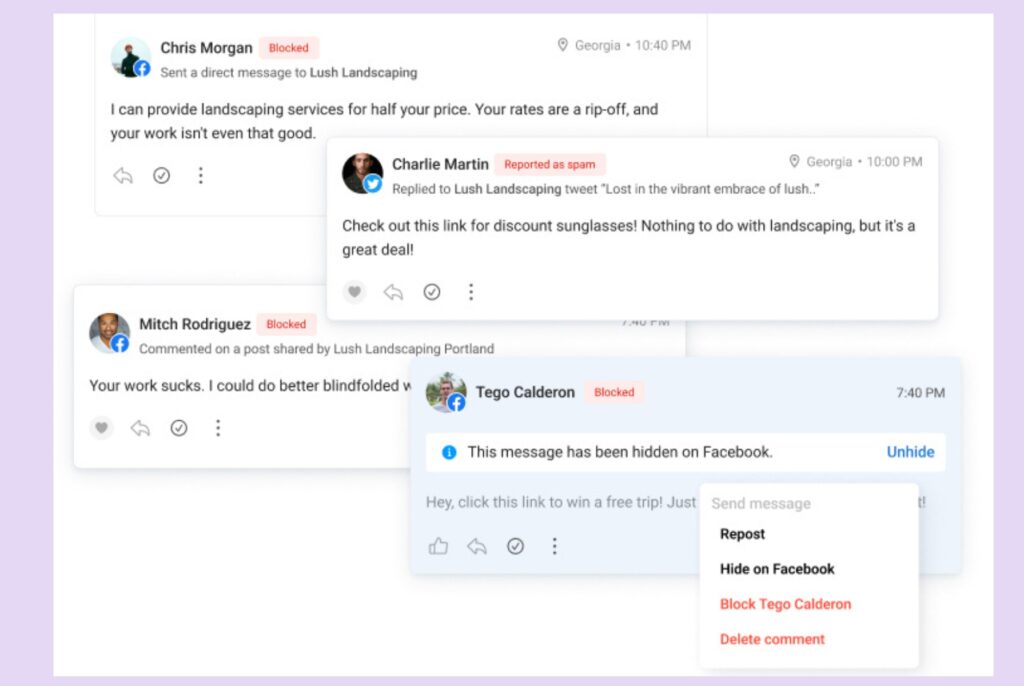
3. Data-driven content optimization
Reaching the right audience at the right time is crucial for maximizing engagement. Use tools with A/B testing functionalities for better social media optimization. This allows you to experiment with different content formats and posting times based on data, ensuring your messages reach the maximum number of engaged followers.
4. Integrations with marketing automation
Efficiency is a must-have. Integrating your social media management platform with marketing automation tools is a game-changer. It helps nurture leads from social media into loyal followers who regularly engage with your content.
5. Advanced ROI measurement
Demonstrating the impact of social media efforts on clients and stakeholders is crucial. Tools with advanced reporting that track key performance indicators (KPIs) specific to thought leadership goals (e.g., brand awareness, website traffic, lead generation) are essential. With this data, you can quantify the value you bring and optimize your strategies for continued success.
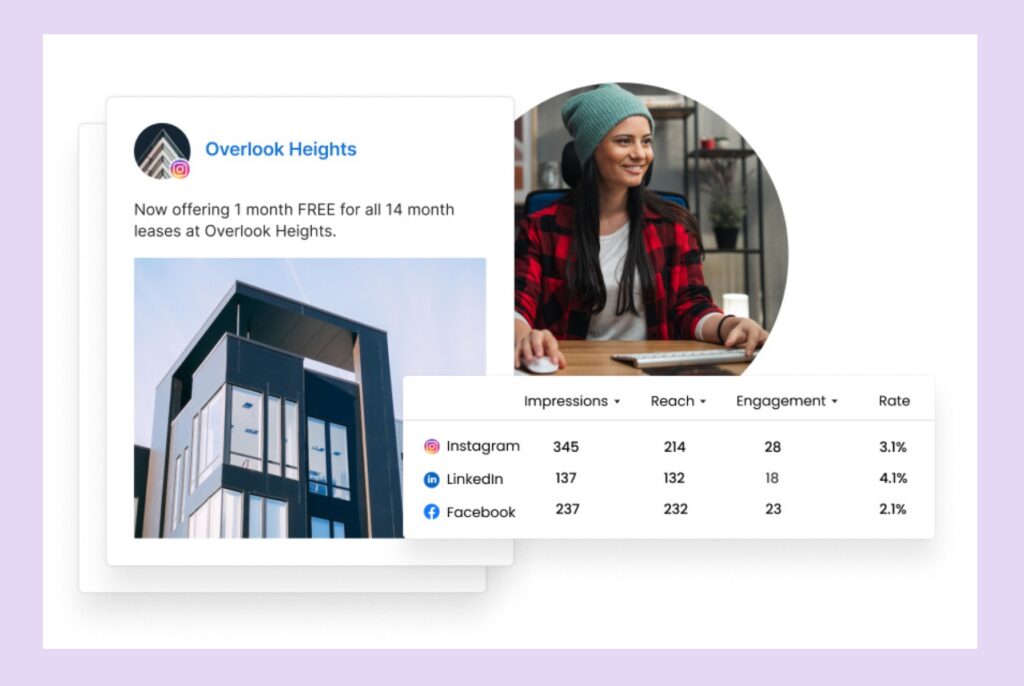
Our customers, their stories: Birdeye Social has been huge in keeping me organized as a social media manager for 90 Facebook pages. I just know that everything is in one place and organized. It's been a huge time-saver! Riley Torrence, Social Media Manager, Pacifica Senior
6. Benchmarking for differentiation
Understanding what resonates with your audience compared to your industry peers is invaluable. Tools that offer competitor benchmarking features allow for analyzing their social media strategies and identifying areas for differentiation, ensuring your content remains fresh and relevant.
7. Repurposing evergreen content for better ROI
Getting the most out of your content is essential. Tools with curated content functionalities are a dream come true. Imagine transforming valuable insights from long-form content like blog posts into bite-sized social media formats. This extends the reach of your ideas and maximizes your content ROI.
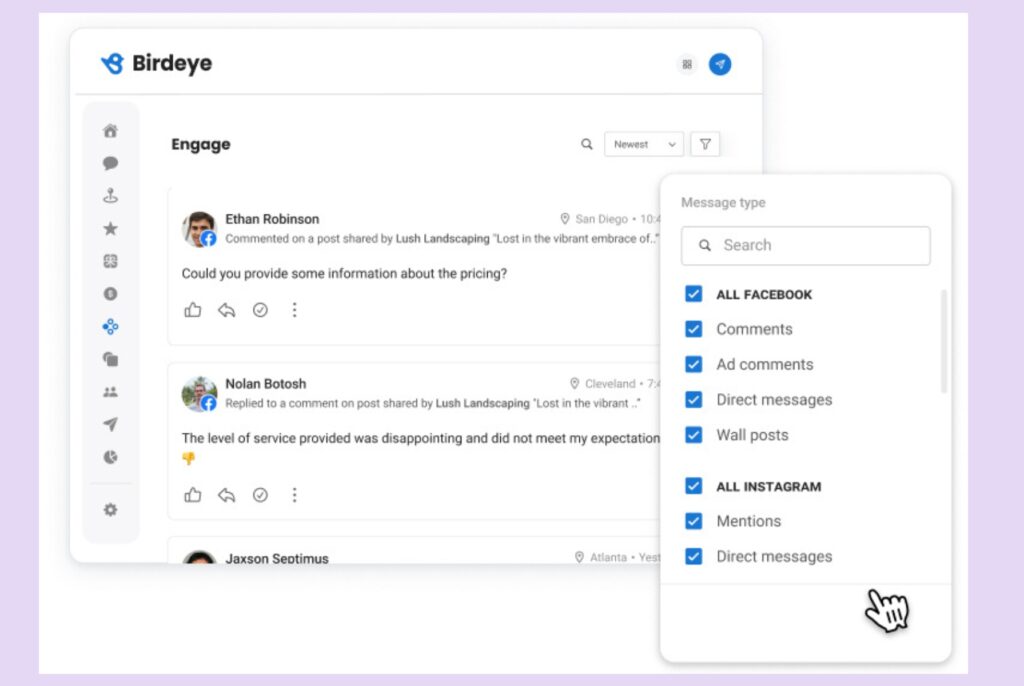
8. Navigate regulations with confidence
Thought leaders often operate within complex brand guidelines and industry regulations. Tools offering social media compliance management features can be a lifesaver, helping you stay on top of relevant regulations and avoid potential legal or brand reputation issues.
9. Save time with recurring post scheduling
Streamlining your content calendar frees up valuable time for strategic tasks. Features like recurring social media post scheduling options allow for consistent content delivery without the need for constant manual scheduling. This allows you to focus on crafting insightful content and engaging with your audience in a more meaningful way.
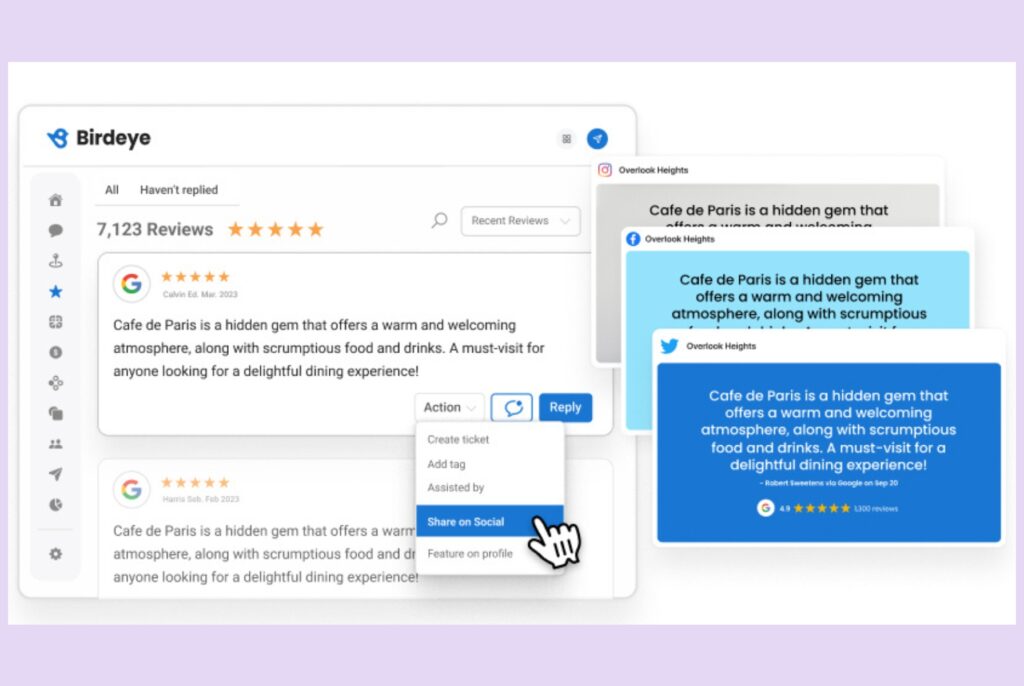
10. Showcase expertise with white-label reporting
Presenting your social media success story in a professional light is key. Tools that offer white-label reporting and branded analytics allow you to showcase your social media performance data in a customized format that aligns with your personal brand. This boosts your credibility and strengthens your reputation as an industry thought leader.
What are some resources to learn more about social media management tools?
When researching and evaluating different social media management tools, it’s essential to explore various resources to comprehensively understand their features, capabilities, and user experiences. Here are some valuable resources to consider:
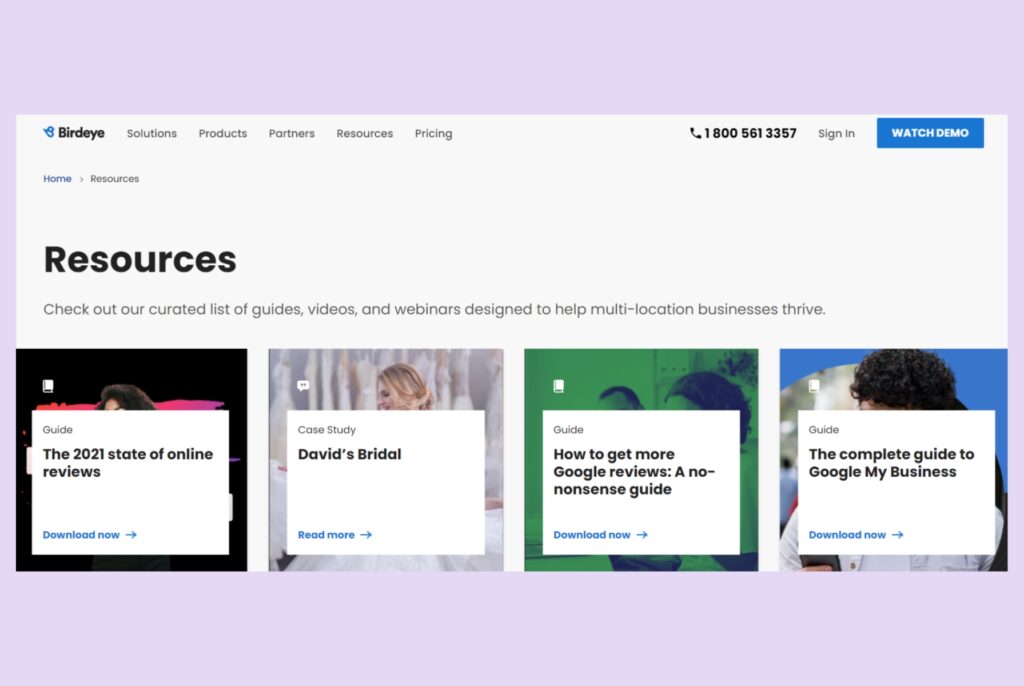
1. Social media management tool provider’s website
- Most social media management tools offer dedicated resources on their websites. Explore blogs, tutorials, case studies, and webinars to understand their functionalities.
2. Industry publications and blogs
- Reputable marketing publications and social media blogs frequently publish reviews, comparisons, and best-of lists for social media management tools. Stay updated on the latest trends and discover hidden gems.
3. Online review platforms
- eCommerce review sites like G2 Crowd and Capterra provide valuable insights into real-world experiences with different social media management tools. Read honest feedback to understand the strengths and weaknesses of each option.
Apart from these, you can also explore Birdeye blogs as your go-to resource to learn more about social media management. Here’s how it empowers you:
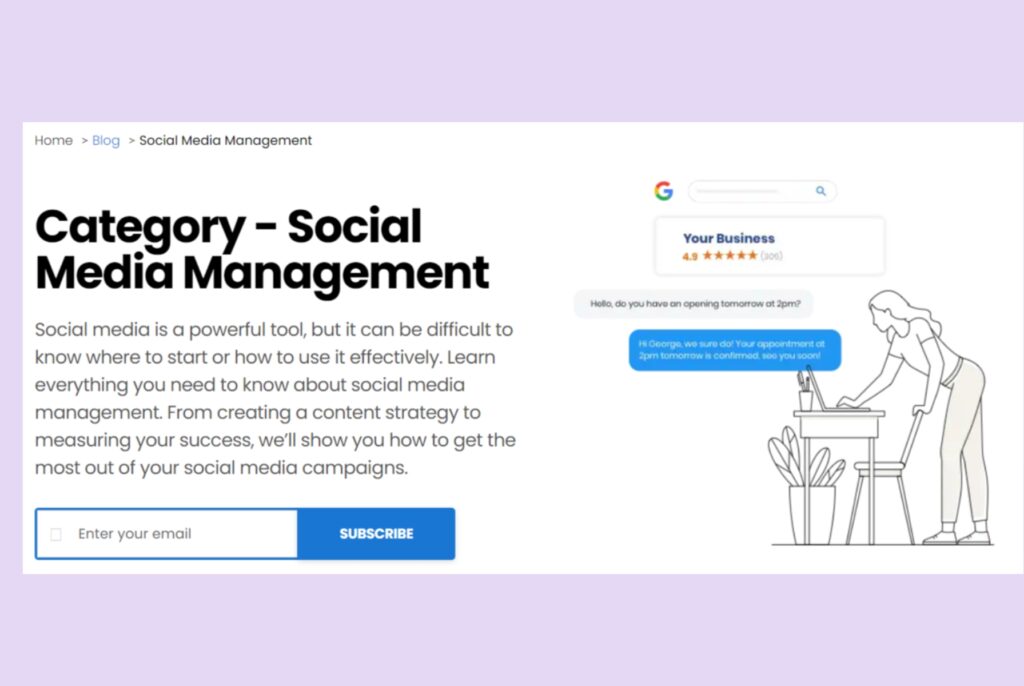
- In-depth guides into popular social media management tools’ features, benefits, and limitations.
- Data-driven insights that are backed by industry expertise to help you maximize and achieve your social media ROI.
- Focus on customer experience that offers a unique perspective and how social media management tools can be leveraged to foster stronger relationships.
- Stay ahead of the latest trends and innovations as we regularly publish fresh content.
So, the next time you research social media management tools, make Birdeye’s blog your first stop. We’ll equip you with the knowledge and insights to choose the power of social media for your brand.
Explore all the benefits of a powerful social media management platform at a price that fits your business. Explore Birdeye's pricing options today!

FAQs on social media management tools
Social media management tools help you schedule posts, analyze performance, and manage interactions across all your social media platforms in one place.
Businesses of all sizes, marketers, influencers, and anyone who wants to streamline their social media presence can benefit from these tools.
Some key features are scheduling, analytics, content creation, social listening, and collaboration.
Team size, budget, supported platforms, features needed, and ease of use are important factors.
Some tools offer content creation features like post templates and integrations with design platforms.
By allowing for better scheduling and content planning, these tools can help improve engagement over time.
These tools provide insights on reach, engagement, and audience demographics to help you understand what resonates with your followers.
Birdeye is one of the leading social media management tools for multi-location businesses. Hootsuite, Buffer, Sprout Social, and Later are popular options.
Over-reliance on automation can lead to inauthentic content. Tools should be used to enhance your strategy, not replace human interaction.
No! These tools can be just as valuable for growing your audience and refining your strategy, even if you’re starting with a small following.
Use Birdeye’s Social media management tool to power up your thought leadership
Say goodbye to social media struggles. Birdeye’s Social media management software empowers you to manage like a pro, engage your audience, and solidify your brand authority.
Schedule your free demo today.

Originally published




